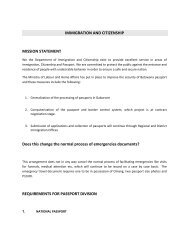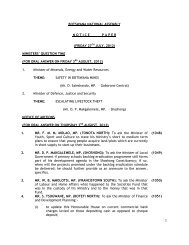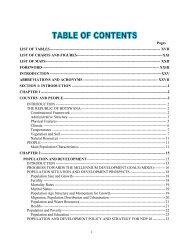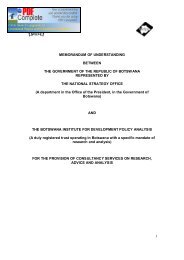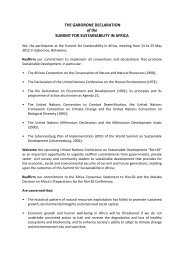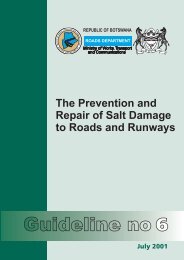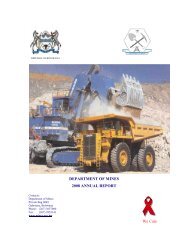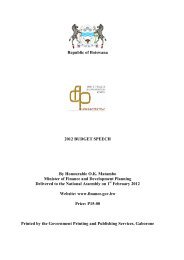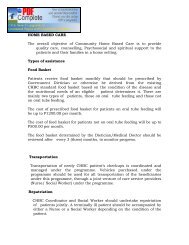National Nutrition and HIV/AIDS Guidelines for Service Providers of ...
National Nutrition and HIV/AIDS Guidelines for Service Providers of ...
National Nutrition and HIV/AIDS Guidelines for Service Providers of ...
You also want an ePaper? Increase the reach of your titles
YUMPU automatically turns print PDFs into web optimized ePapers that Google loves.
clients, preference should be given to multiple micronutrient supplements which contain amounts <strong>of</strong><br />
nutrients not exceeding 100% <strong>of</strong> the RDA.<br />
4.1.3 Symptomatic<br />
Protein: Symptomatic <strong>HIV</strong> positive persons present with several opportunistic infections that affect<br />
their nutritional status. These opportunistic infections increase their nutritional requirements <strong>and</strong> may<br />
also impair nutrient intake as explained in chapter 3. There<strong>for</strong>e the protein needs <strong>of</strong> symptomatic <strong>HIV</strong><br />
infected persons may increase significantly due to opportunistic infections, depletion <strong>of</strong> stores <strong>and</strong><br />
impaired dietary intake. To address this situation, It is generally recommended that protein intake be<br />
increased by 10% in symptomatic <strong>HIV</strong> infected persons. However, where there is capacity to per<strong>for</strong>m<br />
nutrition assessment, it is best <strong>for</strong> dietitians to assess <strong>and</strong> estimate the protein needs because the<br />
needs differ from one individual to another depending on the severity <strong>of</strong> infections<br />
In less severe situations, protein needs may be met through a regular balanced diet with additional 2 3<br />
servings <strong>of</strong> protein rich foods.<br />
Energy: <strong>HIV</strong> infected persons displaying symptoms require between 20-30% more energy to meet the<br />
elevated needs due to infections <strong>and</strong> changed metabolism. These extra energy needs may also be met<br />
by additional servings across the various food groups. The energy increases remain the same whether or<br />
not the <strong>HIV</strong>-infected person takes ARV treatment. In some situations such as impaired oral intake<br />
<strong>and</strong>/or poor food tolerance a modified diet may be more appropriate. In such situations clients should<br />
be referred to a dietitian.<br />
Micronutrients: In symptomatic <strong>HIV</strong> infected persons the need <strong>for</strong> some micronutrients are higher.<br />
Examples <strong>of</strong> some <strong>of</strong> the micronutrients that may be needed in higher amounts are; Vitamin A, E, B-<br />
complex, Copper, selenium <strong>and</strong> Zinc. A client's need <strong>for</strong> these should be established first by a medical<br />
provider who will also prescribe as he finds appropriate. A dietitian should be consulted <strong>for</strong> more<br />
in<strong>for</strong>mation on the dietary sources <strong>of</strong> specific micronutrients.<br />
4.1.4 Advanced Stage<br />
Protein: Protein requirements <strong>for</strong> people with advanced <strong>HIV</strong> infection are 10% higher than the needs <strong>of</strong><br />
uninfected people <strong>of</strong> the same age, sex, weight <strong>and</strong> height.<br />
Energy: Energy requirements <strong>for</strong> people with advanced <strong>HIV</strong> infection are 20-30% higher than their<br />
seronegative counterparts. However, given the numerous medical <strong>and</strong> nutritional complications in<br />
people with advanced <strong>HIV</strong> infection, their nutritional needs should be established by an experienced<br />
health pr<strong>of</strong>essional. Preferably, a team <strong>of</strong> medical pr<strong>of</strong>essionals <strong>and</strong> dietitians should be involved in the<br />
care <strong>of</strong> people with advanced <strong>HIV</strong> infection.<br />
Micronutrients: Micronutrient requirements are also higher <strong>for</strong> the advanced stage as compared to the<br />
asymptomatic stage. While, it has also been established that the requirements <strong>for</strong> some<br />
micronutrients is higher compared to others, it is still recommended that if supplements are deemed<br />
necessary, they should be provided as multiple micronutrient supplements instead <strong>of</strong> single nutrients<br />
supplements. In addition, supplement should be provided in amounts not exceeding 100% <strong>of</strong> the RDA.<br />
NB: Single micronutrient supplements need to be used with caution <strong>and</strong> proper guidance<br />
18



